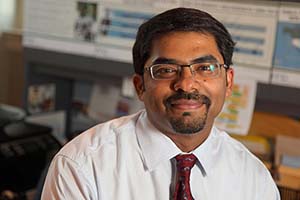Section - Banner - Research

Breadcrumb
- Research
- Researcher Profiles
- Face to Face
- Dr. Madhukar Pai
Navigation Menu
- Research Centres
- Programs
- Researcher Profiles
|
Interview with Dr. Madhukar Pai, Director of the McGill Global Health Programs - Associate Director, McGill International TB Centre - Associate Professor, Department of Epidemiology, Biostatistics & Occupational Health, McGill University |
 |
|
March 10, 2015 Source: MUHC. Dr. Pai, this past summer, you have been appointed Director of Global Health Programs at McGill University – a very prestigious position in an evolving field. What are your goals in this new position? At McGill University and at the Research Institute of the McGill University Health Centre (RI-MUHC), we have the potential to be a leader in global health and translational research. In all areas of health, there is now an increasing emphasis on translating basic science to get products (e.g. diagnostics, drugs) into clinics, translational epidemiology to get policies implemented at the population level, and translational global health, which can bridge the science-to-service continuum. I am very pleased to have this opportunity to provide leadership in these areas. As Director of Global Health Programs, I am working hard to create a strong and vibrant new global health program that will inspire students to address global health challenges, and facilitate partnerships for faculty members. What will your new responsibilities be? - Global Health Programs will include three major programs: With our current strengths identified (e.g. Tuberculosis, HIV, neglected tropical diseases such as parasitic infections), we will promote our expertise in the McGill network as an attractive setting for training and research. Emerging themes may include trauma, environment, mental health and non-communicable diseases as these will become critically important in the future as developing countries undergo health transition, and non-communicable diseases become the main source of ill health. Are you ready to tackle these responsibilities and how? With my research track record on tuberculosis, global health expertise, and real-world experience in India and South Africa, I am ready to tackle these responsibilities. I cannot accomplish much by myself however – global health is all about teamwork. So, I am seeking the support of colleagues within the Faculty of Medicine at McGill, across the university, our teaching hospitals and the RI-MUHC (e.g. Program on Infectious Diseases and Immunity in Global Health (IDIGH)). We now have an Executive Council in place, we are working on a governance structure, and we have a strategic plan. What advice would you give to students who are interested in this research area? Today, students everywhere are genuinely interested in global health. They feel connected in many ways, and perceive themselves to be global citizens. They are lining up to do global health, and this is a wonderful trend that must be nurtured. In my view, they represent our biggest contribution and hope. If enough young people are enthused about global health, impact will naturally follow. I would advise students to read about global health heroes (e.g. Bill Foege, Paul Farmer) who have made wonderful contributions. Their work is truly inspiring. Global Health Programs already offer several travel and training awards, and I am hoping to increase investments in this area, including mentored research opportunities, and research fellowships. I encourage students to visit the GHP website (http://www.mcgill.ca/globalhealth/), and to actively participate in global health events, courses, competitions, etc. There will be plenty of training opportunities. For example, colleagues in Epidemiology & Biostatistics are now working on a ‘Global Health Option' for all graduate students. In addition, efforts are underway to offer a Summer Institute in Infectious Diseases & Global Health, building on the successful summer program offered by the McGill International TB Centre. What are the qualities needed to become a global health leader? In its broadest sense, global health is about making the world a healthier place. Each of us can choose to make a contribution here, regardless of our discipline, training, or specialization. In addition to excelling in our chosen field, optimism is a key quality – we need to believe that we can make a difference. Perseverance is another critical quality – it is not easy to improve health in many resource-poor settings, and we need to be in it for the long haul. Just think of the years of toil to eradicate smallpox, and to bring polio on the brink of eradication. Global health workers have devoted entire careers to these causes. Team work is obviously crucial. Large scale impact can never be achieved by individuals. This wonderful talk, entitled "What Makes Global Health and the People Who Practice It Special?" by Bill Foege is worth watching: http://www.youtube.com/watch?v=6vQ6ICu7N2Q As a TB researcher, what could you bring in terms of vision and expertise to this new position? As a TB researcher, I have trained and worked in many resource-poor settings, and have successfully developed a strong, well-funded research program supported by grants from agencies such as CIHR, Gates Foundation and Grand Challenges Canada. I also serve as an advisor to a variety of international agencies (e.g. WHO, Stop TB Partnership) and donors (Gates Foundation, Clinton Foundation, UNITAID). I am hoping these experiences will help me build a strong global health program, so that McGill can become competitive in this area and be able to show-case our numerous research and educational programs worldwide. |